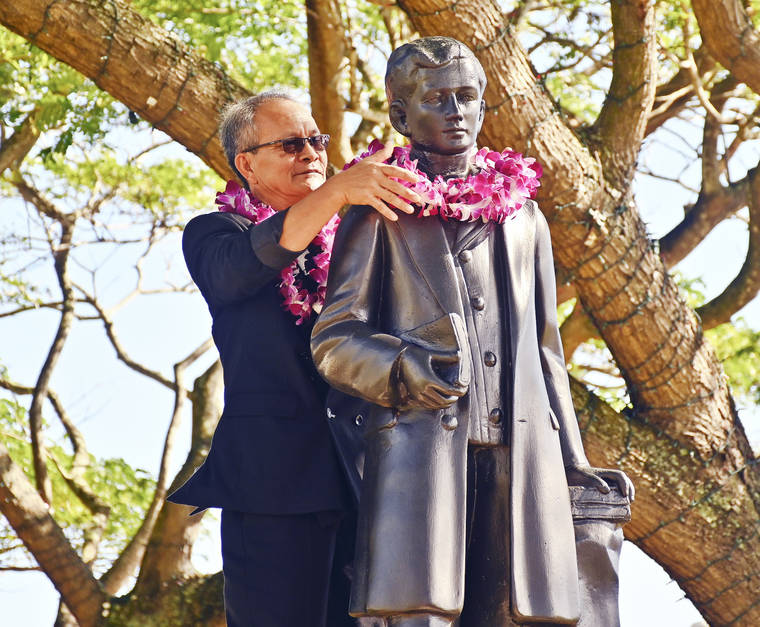LIHUE — Dr. Jose Rizal, considered as one of the greatest heros in Philippine history, was executed on Dec. 30, 1896.
His namesake day marking his death anniversary was first created in 1898 by the first president of the Philippines, Emilio Aguinaldo and commemorates the nationalism and martydom of Rizal.
Sunday, leaders and representatives of the Filipino community organizations and clubs collected at the statue of Dr. Jose Rizal to offer floral tributes and inspirational messages derived from Rizal’s numerous literary works on the lawn of the Historic County Building, heralded by the rumble of a motorcycle convoy on its Sunday cruise.
“For myself, I was asked why being Miss Hawaii Filipina meant to me,” said Miss Hawaii Filipina 2019 Isabel Gampon who was home from college for the winter break. “It was always about learning more about my Filipino heritage and immersing myself in my culture.”
Mario Trinidad, president of the Kauai Filipino Community Council — presenting organization of the Miss Kauai Filipina Scholarship Pageant — said Rizal was born on June 19, 1861 and is credited as starting the Philippine revolution against the Spanish before his execution 141 years ago.
“Knowledge is power, and Dr. Rizal definitely proved this,” Gampon said. “He came from humble beginnings, being one of 11 children. He valued education, attending three universities and becoming conversant in 22 languages. Dr. Rizal believed in picking up a pen rather than a sword to create the difference the Philippines deserved.”
Rizal, described as a man of many talents, was notably a writer and poet, learning medicine to care for eyesight problems his mother suffered.
“His novels — “Noli me Tangere (translated “Touch me not”)” and the sequel “El filibusterismo (translated “The Filibustering,” or “Reign of Greed”) — spoke of the injustices faced by the Filipino people,” Gampon said. “They were indirectly responsible for sparking the Philippine Revolution against Spanish rule. His legacy lives on with the Philippines declaring independence from Spain on June 12, 1898.”
As an advocate for Philippines equality, and the separation from Spanish rule, Rizal was arrested for treason and convicted on the grounds of rebellion, sedition, and conspiring against the government. He was sentenced to execution by a firing squad, and his death was the final straw for the Filipinos.
“Dr. Rizal was aware of the long and rich history of the Philippines and its people,” Gampon said. “He has impacted countless lives, and his selflessness will never be forgotten. He is a hero to the Filipino community — so much so that my uncle, Jose Rizal Gampon, was named after him. My family takes pride in where he came from, and how we got here. Dr. Rizal once said, ‘he who does not know how to look back at where he came from will never get to his destination.’ If it were not for him, our story could havbe been a lot different.”
•••
Dennis Fujimoto, staff writer and photographer, can be reached at 245-0453 or dfujimoto@thegardenisland.com.



